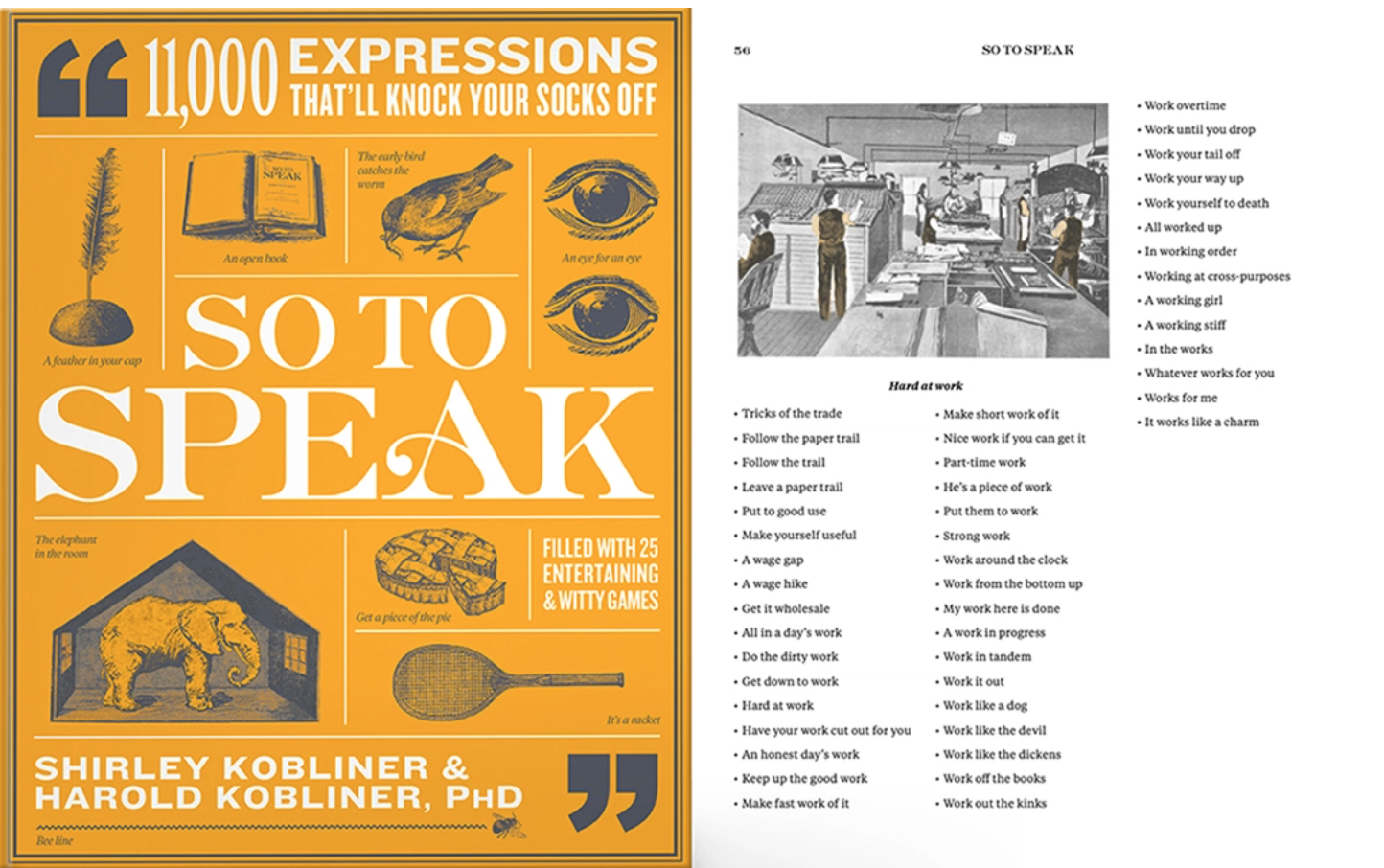I’m going to make a case for embracing clichés, sayings, and idioms in the workplace in 2021. (That’s idioms, not idiots.) My reason is simple. Scratch the surface of some of the most familiar work-related expressions, and you’ll find something unexpected: actual wisdom—for working smartly and for staying centered and sane in the new year.
While many people miss the camaraderie of the in-person office—coffee runs with coworkers, watercooler banter about the latest Netflix series—one thing that hasn’t changed in our virtual workspace is the use of slang and turns of phrase.
To be clear, I’m not a fan of business talk that is confusing, not to mention irritating. Handing in a project you worked on for a long time, only to be told you should “try to think outside the box, zoom out to 30,000 feet, take a deep dive for something that’s scalable, and then circle back and ping everyone before you pivot” can test anyone’s patience.
Clearly, there is no place for office jabberwocky like this. But a new book, So to Speak: 11,000 Expressions That’ll Knock Your Socks Off, celebrates expressions—including some of the most egregious—and argues that they are worth preserving. The world’s largest collection of its kind, it took the authors 13 years to fill up 26 notepads with expressions, sort their enormous list into 67 quirky categories, and devise dozens of original word games. (You can play a few online at SoToSpeakBook.com.) What’s more, they included only expressions they heard with their own ears or saw with their own eyes—on the radio and TV, and from friends, family, and the guy at the grocery store—no Google allowed. It was an awesome undertaking. I know because the authors are my parents, Shirley and Harold Kobliner.

So to Speak curates and catalogs everyday figures of speech, including a chapter on the language of work, and it makes clear that expressions are more than just words. They reflect what’s going on› at the time, and discussing them is a great way to connect with people from all walks of life across generations. Some of the most workaday workplace expressions tell stories. Gig economy is rooted in the jazz-speak of the 1920s, when gig took on the meaning of a paying performance. When you ask an employee to go the extra mile, you’re paraphrasing the New Testament. And if you are working the graveyard shift, rather than pulling an overnight in the funeral business, you’re talking like a sailor, me hearties. (Aboard ship, it was believed that the night watch was when all the bad stuff happened.)
Here’s a quick and dirty dive (not a superdeep one) into seven expressions from So to Speak, and how they can help us to be more mindful at work in 2021, when we have so much on our minds.
Don’t give up your day job
This tough-love classic might sound harsh in “normal” times, but with unemployment at levels unparalleled since the Great Depression, right now the key is finding and keeping a job. That’s why it’s good to take a breath and say to yourself, “This may not be my dream job, but I have to hang in there. For now.” (Just make sure your Zoom is muted.) Adjusting your expectations until the economy rebounds can go a long way toward inoculating yourself against the very understandable feelings of depression and anxiety that can come from setting superhigh standards for yourself in a (temporary) period of limited prospects.
The customer is always right
In tricky times, everyone gets impatient and cranky. Recently a friend was taking an at-home Covid test. The nurse was shouting instructions about how to spit into the tube, while she held her screaming baby in her arms. My friend said, “At first I was like, ‘I have things to do,’ and then I checked myself and realized this woman is trying her best to do her job from her living room with her newborn. I could smile at her and take the 60 seconds it takes to be kind.” The takeaway: It’s good to remember to show understanding. And this doesn’t just hold true for customers and clientele. Colleagues, bosses, subordinates, vendors—anyone who’s counting on you in the workplace—deserves a pass these days.
She’s a workhorse
Working from home has intensified the pressure to log on at all hours. In a recent survey, 4 out of 5 respondents said they find it hard to “shut off” when nighttime rolls around. It’s not always possible when deadlines loom, or orders need to be filled. But beware of treating every day as a crisis. In the absence of regular office hours, try to set a routine for yourself that marks the beginning and end of your workday. And let the people you work with—and for—know that, say, on Monday and Wednesday nights you’re on homework duty, or that you’re trying not to answer the phone after 8 p.m., unless it’s an emergency, of course. Frankly, these are very tough times, and not all bosses may be able to accommodate. But even simple tips can help you stay centered and sane. One old freelancers’ trick to give shape to a sometimes-shapeless day: Take a stroll before you start work and after you “clock out.” Think of it as your “commute.” Don’t forget, a workhorse can easily burn out if ridden too hard.
Rat race
Looming threats of layoffs and furloughs have only intensified instances of toxic competition in the workplace. If you find yourself in a pitched battle with a coworker, remind yourself that you have only one record to beat in this race, and it’s yours. Make yourself your competition, and you’re destined to keep improving. Darwinian workplaces can lead to social undermining, productivity loss, poor employee well-being, high turnover, and the infamous metrics trap that’s, in the end, bad for business, not to mention well-being.
On the market
When I started pounding the pavement after college, my mother (the coauthor, with my dad, of So to Speak) told me, “Let the job find you.” This doesn’t mean lie in bed with YouTube and a bag of Swedish Fish until your dream employer calls. It means be open to any opportunities, even ones that aren’t on your vision board. As the job market starts to open up, make sure you’re willing to consider new career possibilities. Because before long, trust me, we’ll be…
Back in business
This is one of my favorite expressions in So to Speak because it oozes optimism, something that’s in the air as we move forward. As a personal finance expert, I know that positive thinking can only take you so far, especially during a recession. Still, there is a tangible return on optimism. Research has shown that optimists earn more and are more likely to be promoted than pessimists.
Labor of love
And when we’re back in business, maybe you can start looking for that dream job. I have to admit that I didn’t fully understand this expression until I watched my parents write their book. So to Speak wasn’t a labor of love just because they loved doing the work—and they reveled in the late nights discussing how to categorize various expressions, in all the detective work it took to track down new ones once their list hit the five-digit mark—but because the work made them love each other even more. Given their 65 years of happy marriage, I didn’t think this was possible. But that’s one of the greatest rewards of a healthy working life: working together.



